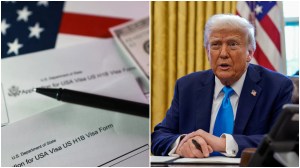For every brand used, ‘trust’ is the pillar behind the entire buying process, creating a loyal team of users. Experts believe that ‘trust’ is also the pillar of blockchain technology. So, what happens when both the branding world and blockchain meet? The transparency and diffused nature of blockchain ensures fairness and accountability. It can help brands get validation and bring transparency and payment for click revenue. Branding exercises deal with defining and enhancing a brand’s positioning and corporate image, communications with its various stakeholders and maintaining consumers’ relationship and trust in the brand. “ Using decentralised digital databases, peer-to-peer information transmission without a third-party mediator, transaction records, transaction audit trail, smart contracts, transaction visibility, lack of data ownership and enhanced data security, among others, blockchain can improve brand management strategies,” Sujata Seshadrinathan, director, information technology (IT) and process, Basiz Fund Services, a fund accounting service provider, told FE-TransformX.
Truly Yours!
The global blockchain market size is expected to grow from $7.4 billion in 2022 to $94 billion by 2027, showing a compound annual growth rate (CAGR) of 66.2%, as per insights from Markets and Markets, a market research platform. As per media reports, luxury brands such as Louis Vuitton, Loro Piana and Maison Margiela, among others, launched services built on the Aura Consortium’s blockchain. This is believed to allow customers to verify that their purchase is authentic. This is believed to allow buyers to scan quick-response code (QR) codes or tap smartphones on products with embedded near field communication (NFC) chips, which will show their authenticity certificates and even origins.
Beyond fashion, the involvement of Walmart, Everledger, Chronicled, and Provenance, among others, shows the acknowledgment of blockchain’s potential to bring transparency across various sectors. Case in point, Walmart traces over 25 products from five different suppliers using IBM Blockchain which is built atop Hyperledger Fabric.Walmart plans to roll out the system to more products and categories in the near future in cooperation with IBM Food Trust. “ The blockchain-based brand market is still in its nascent stage but can be seen growing. Many brands are exploring the potential of blockchain technology to enhance their brand value and customer experience. Use of blockchain in branding can be valuable for not only luxury brands but also in food and beverages and pharmaceuticals, among others,” Meghan Nandgaonkar , head, JDU, Fujitsu, a Japanese multinational information and communications provider, explained.
And the branding game continues…
Experts believe blockchain can allow brands to enhance customer engagement through tokenised rewards and loyalty programs. By tokenising rewards, brands can incentivise desired behaviours while simultaneously fostering a sense of exclusivity and appreciation among customers. “ The ability to launch limited edition non-fungible tokens (NFTs) on the blockchain opens up new avenues for brands to cater to the growing demand for unique and verifiable luxury items. This innovative approach not only satisfies consumer desires but also reinforces brand authenticity in the digital age,” Puspen Maity, CEO, Technosport, an activewear brand, highlighted.
Critics argue that addressing synthetic identity theft within blockchain needs a comprehensive strategy. The use of synthetic identity theft on brands can extend beyond immediate financial losses to potential reputational damage and a loss of customer trust. Such fraudulent activities can undermine the credibility of brands, resulting in a lasting impact on brand loyalty, especially when it comes to luxury brands. “Blockchain’s combination with identity verification measures is crucial for heightened security in the online shopping landscape. Integrating biometric authentication, such as fingerprint or facial recognition, with blockchain, reinforces identity verification, raising the bar for malicious actors attempting to exploit vulnerabilities,” Vaibhav Tare, chief information security officer, Fulcrum Digital, an IT service provider, said.
Industry experts believe that besides countering counterfeits, blockchain also serves as a digital testament, ensuring authenticity in a brand’s journey, product origin, and supply chain, all things that add credence, particularly in the case of luxury brands. While the benefits of blockchain in branding are substantial, its adoption can present certain hurdles. “Challenges such as scalability limitations, technical complexities, and resistance to change, among others may hinder implementation efforts, requiring careful planning and strategic execution to overcome. Brands that embrace blockchain technology early on stand to gain a competitive edge and establish themselves as leaders in trust and transparency within their respective industries,” Sathvik Vishwanath, co-founder and CEO, Unocoin, a cryptocurrency exchange, concluded.








